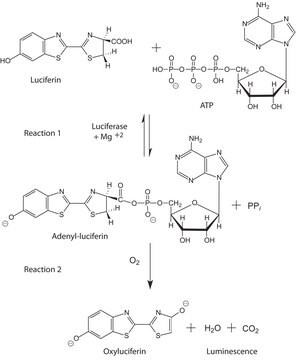おすすめの製品
輸送温度
dry ice
保管温度
−20°C
詳細
The Transcreener® HTS Assay platform overcomes the need for time-consuming, one-off assay development for individual members within a group transfer enzyme family by utilizing a single set of assay reagents that detect an invariant product. The generic nature of the Transcreener® HTS Assay platform eliminates delays involved in assay development for new HTS targets, and greatly simplifies compound and inhibitor profiling across multiple target families.
The Transcreener® ADP2 fluorescent intensity (FI) assay extends the Transcreener® platform for ADP detection by utilizing a simple fluorescent intensity output which can be used on both fluorescence readers typically found in academic and therapeutic research labs as well as more complex multimode plate readers more commonly used in core facilities and HTS labs. The Transcreener® ADP2 FI Assay is a red, competitive fluorescence intensity (FI) assay based on the detection of ADP and therefore is compatible with any enzyme class that produces ADP, including protein, lipid, and carbohydrate kinases, ATPases, DNA helicases, carboxylases and glutamine synthetase. The Transcreener® ADP2 Assay is a simple one step homogenous detection assay, and is flexible with regard to ATP concentration (0.1 to 100 μM ATP). The assay provides excellent signal at low substrate conversion, with a Z′ = 0.7 at 2.5% ATP conversion using 1 μM ATP.
The Transcreener® ADP2 FI Assay was developed to follow the progress of any enzyme that produces ADP. The Transcreener® ADP Detection Mixture comprises a quenched ADP Alexa594 Tracer bound to the ADP2 monoclonal antibody conjugated to an IRDye® QC-1 quencher licensed from LI-COR®. The tracer is displaced by ADP, the invariant product generated during an enzyme reaction. The displaced tracer becomes un-quenched in solution leading to a positive increase in fluorescence intensity. Therefore, ADP production is proportional to an increase in fluorescence. The red tracer minimizes interference from fluorescent compounds and light scattering.
View full Transcreener® product list
The Transcreener® ADP2 fluorescent intensity (FI) assay extends the Transcreener® platform for ADP detection by utilizing a simple fluorescent intensity output which can be used on both fluorescence readers typically found in academic and therapeutic research labs as well as more complex multimode plate readers more commonly used in core facilities and HTS labs. The Transcreener® ADP2 FI Assay is a red, competitive fluorescence intensity (FI) assay based on the detection of ADP and therefore is compatible with any enzyme class that produces ADP, including protein, lipid, and carbohydrate kinases, ATPases, DNA helicases, carboxylases and glutamine synthetase. The Transcreener® ADP2 Assay is a simple one step homogenous detection assay, and is flexible with regard to ATP concentration (0.1 to 100 μM ATP). The assay provides excellent signal at low substrate conversion, with a Z′ = 0.7 at 2.5% ATP conversion using 1 μM ATP.
The Transcreener® ADP2 FI Assay was developed to follow the progress of any enzyme that produces ADP. The Transcreener® ADP Detection Mixture comprises a quenched ADP Alexa594 Tracer bound to the ADP2 monoclonal antibody conjugated to an IRDye® QC-1 quencher licensed from LI-COR®. The tracer is displaced by ADP, the invariant product generated during an enzyme reaction. The displaced tracer becomes un-quenched in solution leading to a positive increase in fluorescence intensity. Therefore, ADP production is proportional to an increase in fluorescence. The red tracer minimizes interference from fluorescent compounds and light scattering.
View full Transcreener® product list
数量
3013-A = 200 assay, 96-well
3013-1K = 1,000 assay, 384-well
3013-10K = 10,000 assay, 384-well
3013-1K = 1,000 assay, 384-well
3013-10K = 10,000 assay, 384-well
物理的形状
Kit with buffered aqueous solutions
法的情報
IRDye is a registered trademark of LI-COR, Inc.
LI-COR is a registered trademark of LI-COR, Inc.
Transcreener is a registered trademark of BellBrook Labs
シグナルワード
Warning
危険有害性情報
危険有害性の分類
Eye Irrit. 2
保管分類コード
12 - Non Combustible Liquids
WGK
WGK 3
引火点(°F)
Not applicable
引火点(℃)
Not applicable
適用法令
試験研究用途を考慮した関連法令を主に挙げております。化学物質以外については、一部の情報のみ提供しています。 製品を安全かつ合法的に使用することは、使用者の義務です。最新情報により修正される場合があります。WEBの反映には時間を要することがあるため、適宜SDSをご参照ください。
毒物及び劇物取締法
キットコンポーネントの情報を参照してください
PRTR
キットコンポーネントの情報を参照してください
消防法
キットコンポーネントの情報を参照してください
労働安全衛生法名称等を表示すべき危険物及び有害物
キットコンポーネントの情報を参照してください
労働安全衛生法名称等を通知すべき危険物及び有害物
キットコンポーネントの情報を参照してください
カルタヘナ法
キットコンポーネントの情報を参照してください
Jan Code
キットコンポーネントの情報を参照してください
最新バージョンのいずれかを選択してください:
Sungsoon Fang et al.
Nature medicine, 21(2), 159-165 (2015-01-07)
The systemic expression of the bile acid (BA) sensor farnesoid X receptor (FXR) has led to promising new therapies targeting cholesterol metabolism, triglyceride production, hepatic steatosis and biliary cholestasis. In contrast to systemic therapy, bile acid release during a meal
H Wada et al.
Journal of bacteriology, 175(2), 544-547 (1993-01-01)
Thylakoid membranes isolated from the cyanobacterium Synechocystis sp. strain PCC6803 were capable of desaturating the acyl groups in monogalactosyl diacylglycerol. This desaturation reaction required the reduced form of ferredoxin.
ライフサイエンス、有機合成、材料科学、クロマトグラフィー、分析など、あらゆる分野の研究に経験のあるメンバーがおります。.
製品に関するお問い合わせはこちら(テクニカルサービス)





